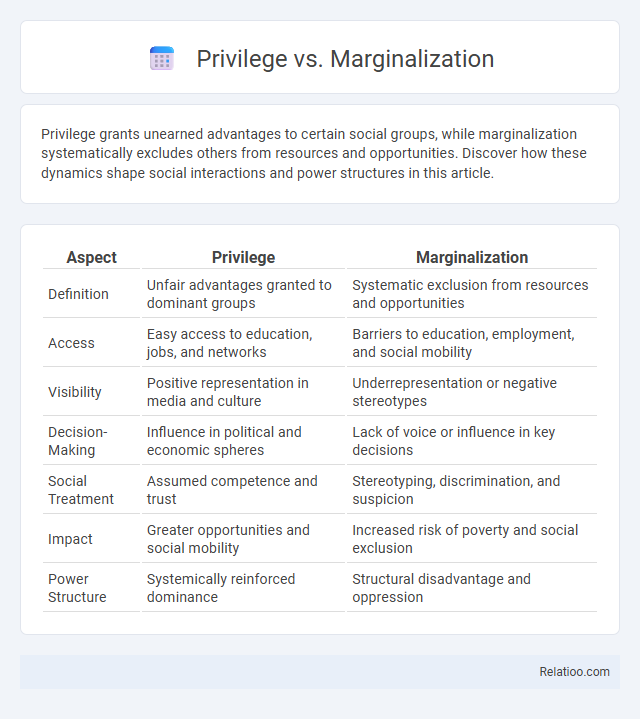Privilege grants unearned advantages to certain social groups, while marginalization systematically excludes others from resources and opportunities. Discover how these dynamics shape social interactions and power structures in this article.
Table of Comparison
| Aspect | Privilege | Marginalization |
|---|---|---|
| Definition | Unfair advantages granted to dominant groups | Systematic exclusion from resources and opportunities |
| Access | Easy access to education, jobs, and networks | Barriers to education, employment, and social mobility |
| Visibility | Positive representation in media and culture | Underrepresentation or negative stereotypes |
| Decision-Making | Influence in political and economic spheres | Lack of voice or influence in key decisions |
| Social Treatment | Assumed competence and trust | Stereotyping, discrimination, and suspicion |
| Impact | Greater opportunities and social mobility | Increased risk of poverty and social exclusion |
| Power Structure | Systemically reinforced dominance | Structural disadvantage and oppression |
Understanding Privilege: Definition and Dimensions
Privilege refers to unearned advantages granted to individuals based on aspects of their identity such as race, gender, socioeconomic status, or ability, creating systemic benefits in society. Understanding privilege requires recognizing its dimensions, including social, economic, and cultural privileges that influence your access to opportunities and resources. Analyzing how these privileges operate helps unveil disparities and challenges faced by marginalized and oppressed groups.
What Does Marginalization Really Mean?
Marginalization refers to the process by which certain groups or individuals are pushed to the edges of society, limiting their access to resources, opportunities, and social participation. It often results from systemic inequalities where power imbalances favor privileged groups, leading to exclusion and diminished social status for marginalized populations. Understanding marginalization requires recognizing the structural barriers that sustain these disparities and impede equitable inclusion.
Historical Contexts of Privilege and Marginalization
Historical contexts of privilege reveal systemic advantages rooted in colonialism, slavery, and institutionalized racism that continue to benefit dominant groups while marginalizing others. Marginalization emerged through exclusion from political, economic, and social resources, reinforcing disparities shaped by legislation, cultural norms, and power dynamics. Oppression manifests as sustained institutional and social practices that limit marginalized populations' access to opportunities, perpetuating cycles of inequality across generations.
Intersectionality: Overlapping Identities and Experiences
Privilege, marginalization, and oppression intersect through intersectionality, highlighting how overlapping identities such as race, gender, class, and sexuality compound individuals' social experiences. This framework reveals that a Black transgender woman, for example, may face unique forms of discrimination distinct from those encountered by individuals solely marginalized by race or gender. Understanding intersectionality is critical for addressing systemic inequalities and creating inclusive social justice policies.
Everyday Examples of Privilege in Society
Everyday examples of privilege in society include being able to walk into a store without fear of being followed or suspected of theft, accessing quality education without systemic barriers, and easily finding representation in media and leadership roles. Your experiences are shaped by societal structures that grant advantages based on race, gender, or socioeconomic status, often invisibly privileging some while marginalizing others. Understanding these subtle yet pervasive forms of privilege helps illuminate the broader patterns of marginalization and oppression impacting marginalized communities.
The Impacts of Marginalization on Individuals and Communities
Marginalization limits access to resources, opportunities, and social participation, leading to economic disadvantages and social exclusion for affected individuals and communities. This exclusion often results in adverse mental health outcomes, reduced educational attainment, and diminished political influence, perpetuating cycles of poverty and inequality. Communities experiencing marginalization frequently face systemic barriers that reinforce inequality and hinder social cohesion and collective advancement.
Systemic Inequality: How Institutions Uphold Privilege
Systemic inequality persists as institutions uphold privilege through policies and practices that disproportionately benefit dominant groups while marginalizing others. Your access to resources, opportunities, and social mobility is influenced by entrenched structures that maintain disparities in wealth, education, and political power. Understanding how privilege operates within legal, economic, and cultural systems is essential to addressing oppression and promoting equity.
Recognizing Unconscious Bias and Its Effects
Privilege, marginalization, and oppression shape societal dynamics through unequal access to power and resources, often reinforced by unconscious bias. Recognizing your unconscious biases involves examining automatic assumptions that influence decisions, perpetuating inequalities and maintaining systemic oppression. Understanding these biases allows you to challenge embedded disparities and promote equity in diverse environments.
Strategies to Challenge Privilege and Support Marginalized Groups
Challenging privilege involves recognizing implicit biases and actively amplifying marginalized voices in your community and workplace. Implementing equitable policies, such as inclusive hiring practices and accessible resources, supports marginalized groups by addressing systemic barriers. Education campaigns and allyship programs foster empathy and sustained commitment to social justice, creating environments where diversity and equity thrive.
Moving Forward: Building Inclusive and Equitable Communities
Moving forward in building inclusive and equitable communities requires recognizing how privilege grants unearned advantages while marginalization and oppression impose systemic barriers on certain groups. You can promote equity by actively dismantling these inequalities through policies that ensure access to resources, representation, and opportunities for all individuals. Emphasizing empathy, education, and collaboration is essential to create environments where every community member feels valued and empowered.

Infographic: Privilege vs Marginalization
 relatioo.com
relatioo.com